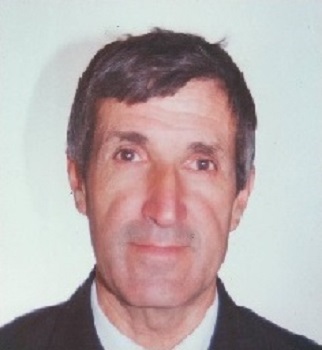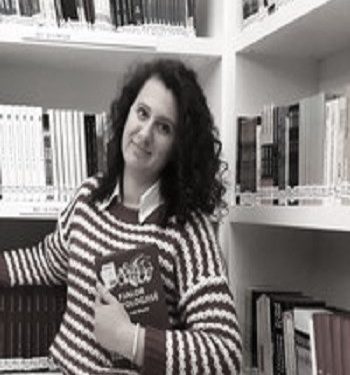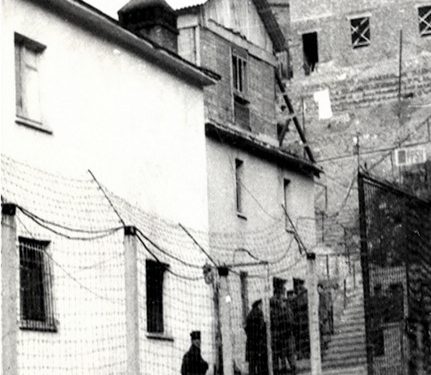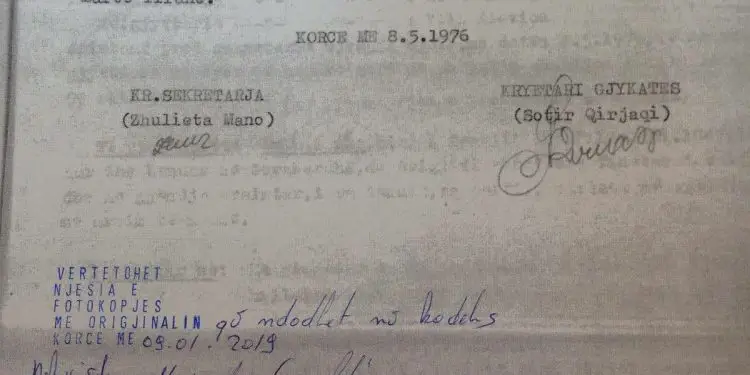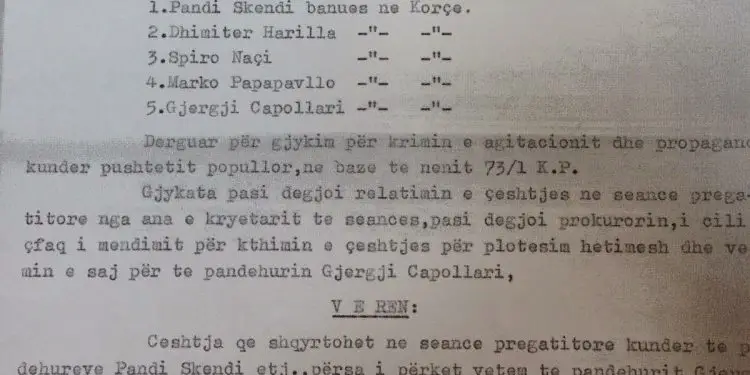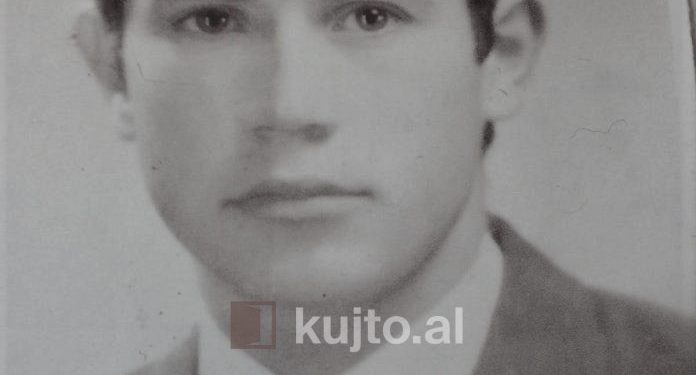By Najada Pendavinji
Memorie.al / Gjergji Çapollari, was sentenced for agitation and propaganda only one year after he had completed his studies in Mathematics with excellent results. The only experimental measurements and mathematical calculations he could make after that were the square meters of the prison cell and the wages earned from working in the gallery, which was seen as a currency to buy freedom. 70-year-old Gjergji Çapollari from Korça tells about the 7 years in the Spaçi camp, the complete isolation and the efforts to survive during those years…!
Mr. Gjergji, how do you remember the moment of your arrest?
To recall events that have remained in my consciousness as indelible, painful traces, and in the inability to describe every moment of that period, is extremely difficult. It was the time when you experienced unexpected turns in life. A year after I finished my studies at the Faculty of Natural Sciences in Tirana with high results, in July 1975, I passed the military corps, which was mandatory, for almost 5 months, in the Erseka Brigade.
It was October 28, 1975, a Tuesday, at 1:30 in the afternoon, where immediately after the training, a soldier of the command comes and informs three students, among whom I was, that we should report to the Brigade Headquarters. We go and enter in turn. It goes in first and never comes out. After 5 minutes, they call me, as soon as I open the door, two armed officer’s jump on me, saying: “In the name of the people, you are under arrest.” For a moment I felt haunted.
I sobered up when I felt the grip of the hands with bars, which were closed ineffectually, to zero, so much so that they have left marks even to this day. After that, they put me in a “BÇ” car, whose license plate was “UP 111”, with the idea that we would stop in Korça. But, after three hours, we stopped in Pogradec, where I stayed for three days in the dungeon, without any kind of explanation! The dungeon was completely empty, gloomy as a tomb, where thoughts attacked me, not allowing me to sleep…!
You spent a long period in the investigator. What were the tortures they used against you?
The investigation of the time was difficult due to the very fact that, in order to extract the truth they were looking for, the investigators showed signs of arrogance, arrogance, physical and mental torture. It was exactly the system of the medieval inquisition. Their intention was to make the investigation as harsh, humiliating and provocative as possible in order to demoralize the prisoner.
My investigation lasted for 11 months, where in an investigation office in Pogradec, I faced four people, who introduced themselves to me as follows: Reshat Leskaj- Chief of Investigation in Korça, Llambi Gegeni- Investigator of the Ministry of Internal Affairs, Ali Dzhunga – Investigator of the Ministry of Internal Affairs and Irakli Koçollari – Investigator in Korça, the latter will examine my case for 11 months.
One of them, Llambi Gegeni, approaches me, giving me a letter, in which it is written: “I, the Investigator of the Ministry of Internal Affairs, Dhimitër Beshiri, after studying the file of Gjergji Çapollari, I request his arrest under the charge of agitation- propaganda, for crimes against the state”.
I did not admit to this charge during the first hearing and they take me back to the dungeon. Inside it, I found Xhevahir Koblara with the nickname “Mançka” who was convicted on the charge of; he had cut the saplings of the forest, only for this reason he was shot. He was arrested on the same day as me, where during that day in Korça, 20 people were arrested and on November 1, 13 families were interned, among them the old Korça family, Kolaci.
After 10 days of staying in the dungeon, the investigators come, now only two of them, Ali Xhunga and Llambi Gegeni, who give me 5-6 forms, where I have to write what I had done during the period from October 11, to the day of my arrest. , on October 28, 1975. This was because they wanted to discover an event that had happened, one day before the birthday of their leader, Enver Hoxha.
Then I wrote that, on Wednesday, October 15, which coincided with the night before his birthday, I was in the television room with my friends, where we were watching the football match between Holland and Germany. This letter ritual was repeated 3-4 times as they wanted me to make a mistake somewhere so that I could not match the events.
It was not for nothing that I mentioned the date of October 15, because on the night of this date in Korça, several slogans were written in the “Themistokli Gërmenji” gymnasium, against the people’s power. Later, we realized that those slogans were written by the State Security agents themselves, who wanted to terrorize the population. On December 25, 1975, I was brought to Korça to dungeon no. 7, where I stayed for almost 3 hours. The door opens and Fatim Hoxha enters, who appears as if he had been arrested for trying to escape. From the investigation of Pogradec, he comes to Korça.
In the conversation above, I asked him where he had conducted the investigation in the Pogradec Branch and he told me: under the stairs. This is when I realized that he was a spy, since Pogradec had a one-story investigation and no stairs. After two days already, the investigator, Irakli Koçollari, comes and tells me: “You have all the work with me”. At this point, you ask me: “How is your cohabitation with the other defendant going?”
I say: It’s good to get rid of him because he’s a spy. They realized that it no longer worked for them and removed it. Always, the State Security and the investigation used spies and their collaborators to provoke or collect information from us prisoners.
In most cases, the interrogation was in offensive tones, with physical violence, during the interrogation, my hands were chained behind my back, to the door key, and I couldn’t feel my shoulders because it was a terrible pain.
Irakli Koçollari always accused me of doing agitation-propaganda, showing me some cards related to human rights in America and France, which I kept at home. To find these, the first cousin’s husband, Gjergji Kajno, had served as an associate of the State Security.
In these cards or pamphlets, there were some suffixes made by someone else, who was Gjergji Kajno and not by me, where it was emphasized that: in Albania there were no human rights and freedom, while in America and in the Western countries, not only they exist, but they are also respected. This alone was enough for you to go through vicissitudes which would continue even after the close of the harsh and strict investigation.
How did your trial go and who was the prosecutor and judge who decided your sentence?
In May 1976, the investigation was closed and after that they brought me an indictment, where I saw that I was part of a group of 5 people, who were: Pandi Skëndi, Pirro Naço, Marko Papallandreo, Gjergji Çapollari (so me), and Dhimtraq Harilla. During the time I was in the dungeon, I was thinking about how I would defend myself in court, being part of this group that I did not know.
Inside the dungeon, they had put a spy again who told the investigator what I was saying. After three or four days, Irakli Koçollari, took the charge sheet from me and gave me another one, in which I was alone, so they had separated me from the group. When I got out of prison, an interesting thing happened to me in terms of this situation.
I am in possession of a copy of a court decision, dated May 5, 1976, in which it was stated that: due to insufficient evidence against the defendant, Gjergji Çapollari, who categorically denied the accusation during the investigation phase, it is not considered necessary for the case to go to court session. Therefore, a second investigation should be carried out, to find him guilty.
The second investigation did not take place, causing the trial to take place three days after the presentation of the indictment. So on May 31, 1976, I appeared in court, where the prosecutor was Fatos Çeta and the judge was Kiço Treska. The trial was open. The prosecutor submits the claim with 8 years of deprivation of liberty and 5 years of deprivation of electoral rights. But the court decided 7 years of deprivation of liberty and three years of deprivation of the right to vote. So I was convicted for: “the crime of agitation-propaganda against popular power”.
Where did he serve his sentence?
In August 1976, I was taken to Spaçi mining prison where I stayed until March 14, 1982, the day of my release. Remembering Spaçi, which has been described as one of the most notorious prisons of the one-party system, gives you strong emotions. In Spaç, you would face hard work in the gallery, physical violence and torture.
Spaçi was a camp built in a hollow surrounded by high mountains, the temperatures in winter were quite low and reached -15 0C. The encirclement of the camp with barbed wire was an element that showed the ferocity of that system, which did not allow any attempt to escape from the camp, placing in each encirclement 60 checkpoints, inside which there was a soldier with a machine gun.
Being able to work, I worked in the mine in the third and fourth zone, one of the most difficult fronts. I had to make the rate well over 100% to sustain myself with the little reward we earned. Here I also tried the dungeon for almost a month after, they found me an Italian dictionary which I had hidden and I was reading it eagerly.
The dungeon was terrible, unplastered, you entered only in your body clothes, no socks; they gave you two blankets, one under one on top, to be brought in at 8:00 in the evening and taken out at 6:00 in the morning. In Spaç, I found other prisoners with whom we shared bread, books, surprises, memories, etc. Nothing dimmed the friendly relationship we had. Therefore, I want to mention some of them, such as: Úngjëll Fidani, Ylber Merdani, Naum Veriga, Nevruz Golka, etc.
How was the condition of the prisoners in the camp, how were you treated there?
The inner life of the prison was a world unlike any other. In the conditions of debilitating loneliness and complete isolation in the dark cells of Spaç where hope seemed weak, the prisoners were transformed into guinea pigs for experimentation, as they were humiliated, raped and exterminated. Nothing disturbed the communist dictatorship more than the free and independent personality of man.
In Spaçi camp, there were two categories of prisoners: those who worked in the mine and those who did not work. The first ones were called “800 grams”, for food reasons, while the second ones were called “600”. Those of us who worked had 800 grams of bread, two meals, where we were given a soup and pilaf and at dinner, a glass of milk, so that we could gain energy to extract the copper and pyrite ore from the gallery.
The camp had about 1800-2000 people, where 1200-1400 of them were working and about 600 stayed in the camp, who were the unemployed who were forced to read Comrade Enver’s works. Even those of us who were at work could not escape from the communist propaganda, listening to the program of Radio Tirana, oriented by the communist ideology.
The ill-treatment they did to us was shown in the most different forms, from food rationing, physical and psychological torture, forced forced labor, long-term isolation in dungeons, etc., which have been destructive to both physical and mental health.
This anti-humane treatment by the communist beast came as a consequence to prevent any kind of resistance that could be made by us prisoners. I remember that one of my fellow sufferers, who had not fulfilled the norm, the next day, the commandant of the camp did not put him to work, but hung him on an iron pole for almost 8 hours, in the cold, which served to terrorize him. . It was animalistic treatment by the police.
In the conditions of contempt, physical and psychological violence, many of the prisoners tried to escape from the prison, which they saw as a way out and escape from hell. I remember that one of the convicts, at the time of the appeal, jumped from the terrace down to the first fence and, as he approached the second fence, grabbed the barbed wire and was executed on the spot.
Images of suppressing resistance in the cruelest way, experiencing despair, loss of faith, but above all the gain of human values and virtues, which are demonstrated in difficult times and situations, abound. There was a fragment, when two prisoners, one ex-officer, managed to escape to the river Drin, but unfortunately, one of them did not know how to swim and they were both shot.
All this shows the presence of violence, which was everywhere and whenever, during the appeal, during the reception of food, during the work fronts, that is, everywhere.
Tell me a special event that sticks in your mind?
In May 1981, a shocking event happened, two of the prisoners were shot, and who were Fadil Kokomani and Vangjel Leshaj, two old, talented journalists of Radio Tirana who had been serving their sentence in Spaçi prison for 16 years. The real reason for their shooting was the letters written by those against the dictator’s power, who demanded the opening of communist Albania and opposed the decisions taken by Enver Hoxha.
It was truly a brave move on their part even though they knew the consequences would be dire. I had a strong friendship with both of them, which made the State Security suspicious of me as well. The slightest suspicion, the tiniest bit of information they might have, led to punishment. During the time they both continued the investigation, I was not taken to work and from moment to moment, I was expecting my arrest again.
Re-sentence would be one of the excruciating circumstances due to the uniformity of time as everything repeats itself. During this period, I was controlled by the State Security and their collaborators, who asked everyone about the closeness I had with the two defendants.
At this time, two of the investigators who, ironically, were Ali Dhunga and Llambi Gegeni, came to interrogate the prisoners regarding the incident, but surprisingly, they did not mess with me and finally decided to they left me alone. This event best shows that your life was played out in the communist clutches.
Tell me a little about the moment when they told you that you would be released from prison…! You had not completed the sentence or not?
Prison is the place where minimum human values and rights are not recognized, where you had hunger, lack of hygiene, beatings, torture, moral humiliation, psychological pressure, etc.; where at any moment, you are controlled even in the sleeping silos. Freedom always seems expensive, before anything else, especially for a convict who has been deprived of it for a period of time.
Out of the 7 years I have been convicted, I have only served 6 years and 5 months in prison. This came as a result of benefiting from a reduced sentence, through the work done by me. So, realizing the 100% rate, I benefited from 10% of the salary, where the reduction of the sentence was calculated with the same coefficient, a percentage which went up to 4-5-6 days, sentence reduction.
A year in prison could be taken off your sentence, albeit through gruesome and grueling labour. Work was always seen as a currency to buy freedom. With my conviction, to break the myth that Tuesday is bad, I stayed at work for another month, to calculate the release from prison, on Tuesday. So I was released on March 14, 1982, 2:00 p.m., Tuesday.
After you were released from prison, how did your life go?
Getting out of prison was always accompanied by enigma and pessimism about the life that awaited us afterwards. During this time, you see that suddenly, the years have passed while you have stayed in one place. Time is not measured in prison. She freezes. So the concept of time was completely unnecessary. I already had a new, but not unknown, challenge to face: discrimination and social persecution awaited me.
I would always be looked at differently because I was no longer that student with high scores, but a shadow with a bad biography, who works in the mines, who goes out early in the morning and comes home late. To close every perspective, hope, faith, illusion, which gave way to fear for the future?
Immediately after the release, in June 1982, I tried work at the Glass Factory in Korça, where I started having eye problems and was transferred to the Rehova Copper Mine, where I stayed until March 1991. From 1992, my life started to change little by little. I was at the bottom of the abyss and I was coming to the surface.
So I was appointed inspector of the High State Control as a supporter of former Political Convicts. In 2001, I realized my dream of going to the distant land, America. And in 2002, I was appointed a Mathematics lecturer at “Fan S. Noli” University in the city of Korça, where I continued to be a part of academic teaching for almost 16 years…! Memorie.al




